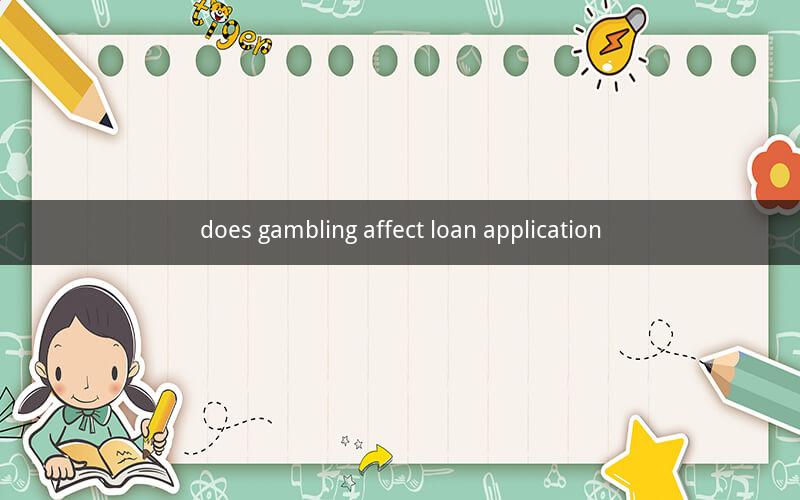
Table of Contents
1. Introduction to Gambling and Loan Applications
2. Understanding the Impact of Gambling on Creditworthiness
3. Factors Influencing the Decision of Lenders
4. Legal and Ethical Considerations
5. The Role of Credit Scoring in Loan Applications
6. Case Studies and Real-Life Examples
7. Strategies for Managing Gambling-Related Risks
8. Conclusion
1. Introduction to Gambling and Loan Applications
Gambling has been a part of human culture for centuries, and it continues to be a popular form of entertainment for many people. However, the rise of online gambling and the ease of access to credit have raised concerns about the potential impact of gambling on loan applications. This article explores the relationship between gambling and loan applications, examining the factors that influence lenders' decisions and the strategies individuals can use to manage gambling-related risks.
2. Understanding the Impact of Gambling on Creditworthiness
Gambling can have a significant impact on an individual's creditworthiness. When applying for a loan, lenders evaluate the applicant's credit score, which is a measure of their creditworthiness. Factors that contribute to a credit score include payment history, debt-to-income ratio, and credit utilization. If an individual has a history of gambling-related debt, it may negatively impact their credit score, making it more difficult to secure a loan.
3. Factors Influencing the Decision of Lenders
Several factors influence a lender's decision regarding a loan application. These include:
- Credit Score: A low credit score may indicate that the applicant is a higher risk, making it less likely for them to be approved for a loan.
- Income and Employment: Lenders often look at an applicant's income and employment history to determine their ability to repay the loan.
- Debt-to-Income Ratio: A high debt-to-income ratio may suggest that the applicant is already carrying a significant amount of debt, making it difficult for them to manage additional debt.
- Gambling-related Debt: Lenders may be wary of approving a loan for an individual with a history of gambling-related debt, as this may indicate a lack of financial responsibility.
4. Legal and Ethical Considerations
The legal and ethical considerations surrounding gambling and loan applications are complex. Some lenders may be reluctant to approve loans for individuals with a history of gambling-related debt, as this may be seen as a sign of poor financial judgment. However, others argue that individuals should have the right to pursue their interests, even if it involves gambling.
5. The Role of Credit Scoring in Loan Applications
Credit scoring plays a crucial role in loan applications. Lenders use credit scores to assess the risk associated with lending money to an individual. A lower credit score may indicate that the applicant is a higher risk, making it less likely for them to be approved for a loan. Conversely, a higher credit score may suggest that the applicant is a lower risk, increasing their chances of loan approval.
6. Case Studies and Real-Life Examples
Several case studies and real-life examples illustrate the impact of gambling on loan applications. For instance, a study by the National Council on Problem Gambling found that individuals with gambling-related debt were more likely to have a lower credit score and face difficulties in securing loans.
7. Strategies for Managing Gambling-Related Risks
Individuals can take several steps to manage gambling-related risks and improve their chances of loan approval. These include:
- Budgeting: Creating a budget can help individuals manage their finances and avoid overspending on gambling.
- Seeking Support: Individuals struggling with gambling addiction can seek support from counseling services or support groups.
- Setting Limits: Setting limits on gambling activities can help individuals stay in control of their spending.
- Monitoring Credit Score: Regularly monitoring credit score can help individuals identify potential issues and take steps to improve their creditworthiness.
8. Conclusion
Gambling can have a significant impact on loan applications, as it may negatively affect an individual's creditworthiness. However, by understanding the factors that influence lenders' decisions and taking steps to manage gambling-related risks, individuals can improve their chances of loan approval. It is essential for individuals to be aware of the potential consequences of gambling and to take responsibility for their financial decisions.
Questions and Answers
1. Q: How does gambling affect creditworthiness?
A: Gambling can affect creditworthiness by increasing debt levels and negatively impacting credit scores.
2. Q: Can lenders deny a loan application based on gambling-related debt?
A: Yes, lenders may deny a loan application based on gambling-related debt, as it may indicate a lack of financial responsibility.
3. Q: What is the role of credit scoring in loan applications?
A: Credit scoring plays a crucial role in loan applications, as it helps lenders assess the risk associated with lending money to an individual.
4. Q: Can individuals with a history of gambling-related debt improve their creditworthiness?
A: Yes, individuals can improve their creditworthiness by managing their debt, budgeting, and seeking support for gambling addiction.
5. Q: What are some strategies for managing gambling-related risks?
A: Strategies for managing gambling-related risks include budgeting, seeking support, setting limits, and monitoring credit score.
6. Q: How can individuals monitor their credit score?
A: Individuals can monitor their credit score by checking their credit reports and credit scores regularly.
7. Q: Are there any legal implications of gambling-related debt?
A: Yes, there may be legal implications of gambling-related debt, depending on the jurisdiction and the specific circumstances of the debt.
8. Q: Can individuals with a history of gambling-related debt secure a loan?
A: Yes, individuals with a history of gambling-related debt can secure a loan, but they may need to take additional steps to improve their creditworthiness.
9. Q: What is the difference between creditworthiness and credit score?
A: Creditworthiness refers to an individual's overall financial responsibility, while credit score is a numerical representation of their creditworthiness.
10. Q: How can individuals avoid falling into gambling-related debt?
A: Individuals can avoid falling into gambling-related debt by setting limits, budgeting, and seeking support for gambling addiction.